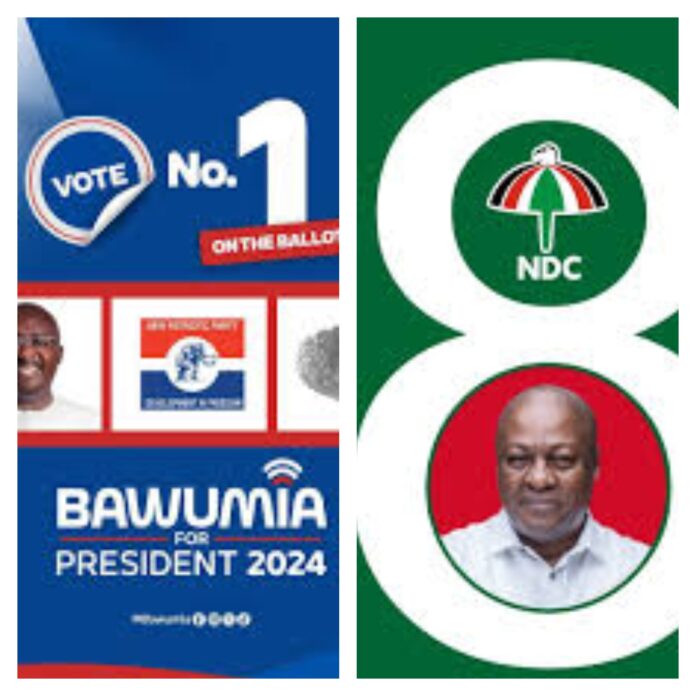As Ghanaians prepare to head to the polls this Saturday, all eyes are on the upcoming election, where voters will decide between two major political contenders: number one and eight.
This pivotal election is set to not only shape the future of the country’s leadership but also test the strength of political engagement in the nation.
With only a few days left before the election, the race has reached a fever pitch, and the campaign trails have been anything but predictable.
Political parties have pulled out all the stops to secure support, with both number one and eight intensifying their efforts to sway undecided voters.
The question on everyone’s mind: Will it be Number One, representing the ruling party with its promises of continuity, or Number Eight, representing the opposition with calls for change and reform?
For many, this election represents more than just a choice between candidates; it is a referendum on the direction Ghana should take in the coming years.
It’s about priorities—whether voters will endorse the incumbent’s track record or embrace the opposition’s vision for the future.
One of the most significant factors in this election will be the youth vote. As a growing demographic, young Ghanaians are increasingly becoming politically engaged and are looking for leadership that speaks to their needs.
Issues such as education, unemployment, and the cost of living have taken center stage in this election cycle, with both number one and eight offering contrasting approaches to these challenges.
Many first-time voters are also feeling the weight of this decision, as they recognize that their choice could determine the direction of Ghana’s economic policies, social justice initiatives, and democratic institutions for years to come.
For them, Saturday’s vote is not just about political allegiance, but about taking part in the future of their country.
Number one, the incumbent, has based much of its campaign on the argument of continuity and stability.
They tout achievements such as infrastructural development, the implementation of social welfare programmes, and the country’s resilience in the face of global economic challenges.
The message has been clear: Let’s continue the progress we’ve made together – they call it UPGRADE.
On the other hand, number eight has positioned itself as the change that Ghana needs, emphasizing economic reforms, job creation, and better governance.
They argue that the country’s progress has stagnated under the current administration and that a new approach is necessary to tackle the pressing issues facing Ghanaians today.
Their slogan? RESET Ghana.
As Ghanaians head to the polls, they are weighing these two competing visions for the nation.
The future of the economy, education, health care, and infrastructure hangs in the balance, and voters are keen to choose a candidate who will address their concerns and priorities.
With the election just days away, concerns about the integrity of the electoral process remain a topic of discussion.
Allegations of voter influence and irregularities have already emerged, including reports of the incumbent MP for Ayawaso West Wuogon, Lydia Seyram Alhassan, distributing food to voters at a special voting event.
While these claims are being investigated, they have raised questions about the fairness and transparency of the election process.
Both local and international observers will be watching closely to ensure that the election is free, fair, and credible.
As voters cast their ballots on Saturday, the integrity of the election process will be as important as the outcome itself.
At the heart of this election is the question of what kind of Ghana Ghanaians want to live in. Voters are not only deciding between number one and eight, but also between two competing visions for the country’s future.
Do they want to continue on the path of stability, as promised by the incumbent, or is it time for a fresh start with the opposition?
Do they trust the current leadership to steer Ghana through the challenges of the next decade, or is it time to hand the reins over to someone else with a new perspective?
With election day fast approaching, Ghanaians must make a crucial decision. Whether it’s number one or eight, every vote counts.
As voters head to the polls on Saturday, they will be making a choice not just for themselves but for future generations of Ghanaians.
As the clock ticks down, the question remains: Which vision will the people of Ghana choose?
One thing is certain—Saturday’s election will be a defining moment in the history of the country, and the results will shape the future of Ghana for years to come.

